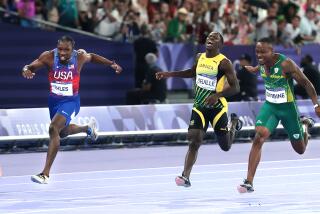BARCELONA ’92 OLYMPICS / DAY 9 : Sotomayor Gets the Gold, at Last : Track and field: The world record-holder from Cuba was deprived of chance to compete at ’84 and ’88 Games.
- Share via
BARCELONA — Four days before the opening ceremony of the 1988 Olympics, Cuba’s Javier Sotomayor broke the world high jump record at a meet in Spain. But instead of boarding a plane bound for Seoul as the gold-medal favorite, he returned home as a pawn in a political game that brought him quickly back to earth.
When Cuba boycotted the Games in 1988, as it had in 1984, none of its athletes was more deprived than Sotomayor, who was so dominant in his event that less than a year later he would become the first and so far only person to clear 8 feet.
Deprived was the word he used when speaking to reporters Sunday. It might have been a faulty interpretation from Spanish to English. Or it might not have been.
In any case, the disappointment was nothing more than a faded memory after he won the high jump in the 1992 Olympics Sunday at Montjuic Stadium. When he realized that victory was his, only the fourth ever for Cuba in track and field, he buried his head in his hands and cried.
“It was a great moment that I hoped to come,” he said. “But I didn’t think it would necessarily happen.”
Nor did almost anyone else. Sotomayor holds the world record at 8 feet, set in 1989, but various injuries have prevented him from approaching that height in the last two years. The best he could do Sunday was 7 feet 8 inches, the lowest winning height in the Games since 1976 at Montreal.
But perhaps the Olympic gods owed him one. Although four other athletes also jumped 7-8, Sotomayor won the gold medal because he had fewer misses. Sweden’s Patrik Sjoberg was second, while the United States’ Hollis Conway, Australia’s Tim Forsythe and Poland’s Artur Partyka tied for third.
Conway’s bronze, to go with his silver from 1988, was one of two medals won by the United States in track and field Sunday. The other was Jackie Joyner-Kersee’s gold in the women’s heptathlon.
Jud Logan of North Canton, Ohio, came close in the hammer throw with his fourth place, the United States’ best finish in the event since Harold Connolly won in 1956. Logan wound up behind three athletes from the Commonwealth of Independent States--Andrei Abduvaliyev of Tazhdikstan, Igor Astapkovich of Belarus and Igor Nikulin of Russia.
Because they will represent their native republics in the future, they were making their last appearance as teammates, a fact that appeared to sadden them. “The former school of Soviet hammer throwing has performed well in its farewell,” Abduvaliyev said.
Russia’s Elena Romanova and defending Olympic and world champion Tatiana Dorovskikh of the Ukraine finished 1-2 for the CIS in a slow, tactical 3,000-meter race. Romanova’s winning time of 8:46.04 was almost 20 seconds behind Dorovskikh’s time at Seoul.
While waiting for someone to make a move, the runners were so closely bunched in a pack of nine entering the final 600 meters that a misstep by one would have sent everyone tumbling. All had spike marks on their legs afterward.
“I spent so much time in the air avoiding spikes that I was doing pirouettes,” said Shelly Steely of Albuquerque, N.M., who finished seventh in 8:52.67. “I should have gotten style points.”
The other American, PattiSue Plumer of Palo Alto, finished fifth in 8:48.29.
“I grabbed Tatiana’s briefs to keep from falling at one point and snapped them,” Steely said. “I tried to keep my composure, but about 20 meters later, I started laughing. She was definitely startled.
“I’m sure she thought I was resorting to the lowest possible tactics by snapping her shorts, but that wasn’t the case at all.”
The high jump competition was not much prettier to watch, perhaps because the athletes were trying to balance the speed they generated on the fast surface against a slight head wind.
“I saw some great high jumping--in front of the bar,” former U.S. Olympian Dwight Stones said.
World champion Charles Austin of Van Vleck, Tex., who tied for eighth, was perplexed. “I thought everyone would jump high,” he said. “I thought 7-9 or 7-10 might get you a medal. But no one even cleared 7-9. That’s crazy.”
Although Sotomayor is only 24, his best days might be behind him because of the injuries to his knees, ankles and feet.
“His body is just breaking up,” Stones said. “He’s been a great high jumper since he was 16. One of the reasons is because he’s always pushed the envelope physically.”
Sotomayor dedicated his gold medal to Cuba. He is the island’s third gold medalist of these Games, the first in track and field.
“I’m sure this will have a positive effect on the entire population,” he said. “It’s clear evidence that in spite of our current problems, we are still capable of great things.”
Track and Field Medalists
* MEN’S HAMMER THROW GOLD Andrei Abduvaliyev (CIS) SILVER Igor Astapkovich (CIS) BRONZE Igor Nikulin (CIS)
* MEN’S HIGH JUMP GOLD Javier Sotomayor (Cuba) SILVER Patrik Sjoberg (Sweden) BRONZE (tie) Hollis Conway (United States) BRONZE Artur Partyka (Poland) BRONZE Tim Forsythe (Australia)
* WOMEN’S 3,000 METERS GOLD Elena Romanova (CIS) SILVER Tatiana Dorovskikh (CIS) BRONZE Angela Chalmers (Canada)
* HEPTATHLON GOLD Jackie Joyner-Kersee (United States) SILVER Irina Belova (CIS) BRONZE Sabine Braun (Germany)
More to Read
Go beyond the scoreboard
Get the latest on L.A.'s teams in the daily Sports Report newsletter.
You may occasionally receive promotional content from the Los Angeles Times.






